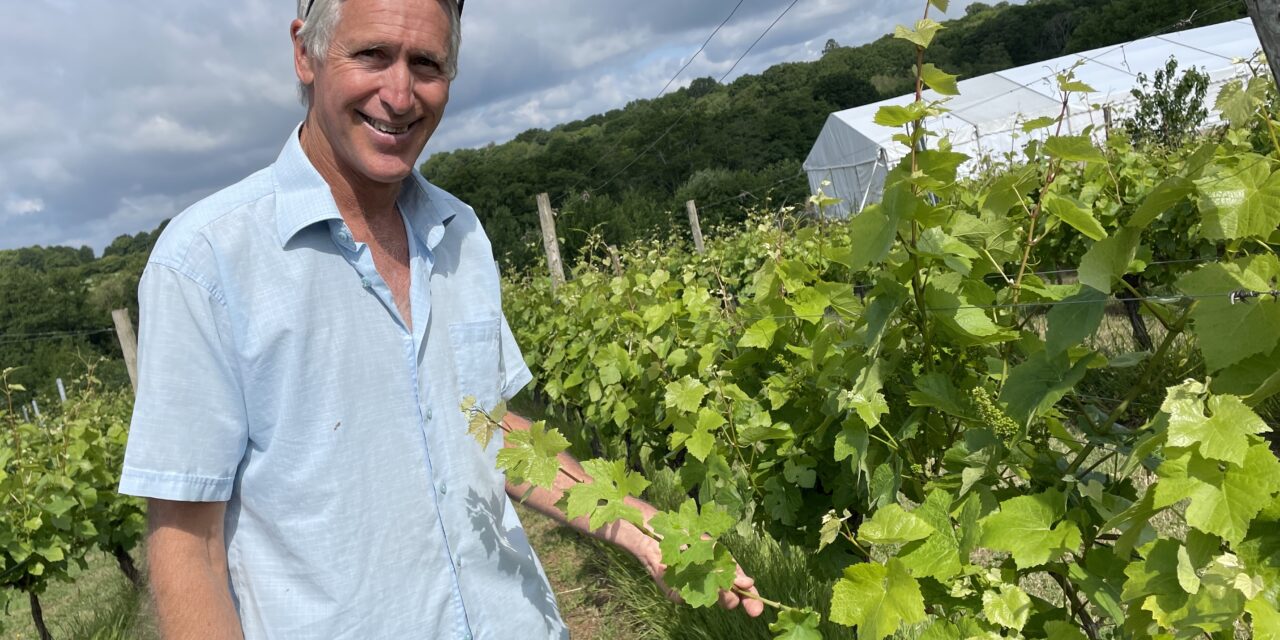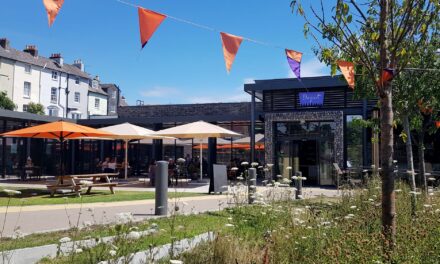Across the Sussex countryside a quiet tourism and economic revolution is rapidly gathering pace. And if a new plan achieves its ambitions, the growth of the county’s wine industry will go through the roof.
Sussex is already home to approximately 140 vineyards which contribute £25million to the area’s tourism sector. But a new growth plan launched recently at the Houses of Parliament aims to grow that a mighty tenfold to £238million by 2040 – creating more than 3,600 new jobs.
English Wine Week
The third week of June is the annual English Wine Week so we decided to catch-up with a local vineyard in East Sussex to see exactly why the county is so good for growing wine, how Sussex wine has a growing reputation, and what the future holds.
The first vines at Bluebell Vineyard near Uckfield were planted out in 2005. Since then it has doubled in size and, now has almost 100 acres “under vine”, growing 10 different grape varieties. And it’s excellent at what it does – it has been awarded over a hundred national and international awards for its range of Hindleap sparkling and Ashdown still wines.
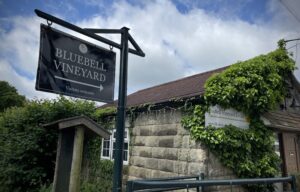
Welcome visitors!
Its winemaker is Kevin Sutherland who meticulously oversees the complex and ever-changing science of wine making in this part of the county. Idyllic is not quite sufficient as a description for this vineyard, which is producing approximately 120,000 bottles of wine each year. Nestled in the beautiful high weald landscape, it has the audible and sometimes visible Bluebell Steam Railway as one neighbour, and Heaven Farm as another.
“The vineyard has grown massively,” Kevin said, “from producing about 30 to 40 tonnes of grapes in 2007, we’re now harvesting around 120 tonnes. You can grow vines pretty much in any soil, not just chalk and flint, we have a mixture here, but the weather conditions make it unpredictable.”
It’s knowledge and experience that count
With some west facing and some south facing fields under vine, it’s obvious that it’s the winemaker’s knowledge and art that makes the real difference. Knowing when to prune, when to harvest, how far to space the vines apart, how hard to press the grapes, and how long to store before bottling, all make a difference to the product. And that’s without the weather.
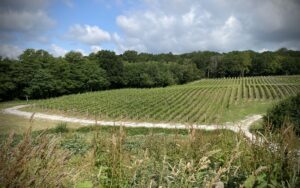
Just part of the 100-acre Bluebell Vineyard.
Kevin added: “It’s often thought that climate change is making it easier to grow vines but it’s swings and roundabouts. It may mean warmer summers but it can also mean earlier springs with increased risk of late frosts which will ruin a crop.”
Climate change
Climate change has been bad for parts of the French wine industry, for example, where hotter temperatures in the Champagne region are making the production of its famous sparkling wines ever more challenging, and summer hailstorms threaten to destroy whole vineyards in one night in parts of the south of France.
The ideal conditions appear to be no late frosts, hot dry summers (or at least dry) and stable autumns. Frosts, storms and heavy rain all pose a major threat to the harvest. And Sussex seems to have an excellent balance of conditions with warm temperatures, less rain, some cooling air off the sea, that all play a part in its rapidly growing reputation for producing some of the very best vintages.
But given the uncertainties and complexities of the growing season, Kevin seems to thrive under the challenge. But when you have 35 years of experience and knowledge, it’s not really surprising. “I came to England on holiday in 1988,” he said, “and the rest, as they say, is history!”
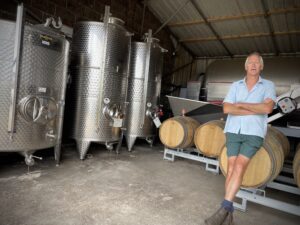
Winemaker, Kevin Sutherland.
While East Sussex has been home since the late 1980s, there’s still as much southern hemisphere as there is southern England about Kevin, who heralds from New Zealand, home, of course, to some of the very best new world white wines in the world.
Kevin has worked at other local vineyards and taught wine-making at Plumpton College before being brought on board to help set up the vineyard at Bluebell.
On a warm day in June, as the sun beats down on the vines which lap it up and almost visibly grow, it’s easy to envy Kevin and his colleagues. “It’s not all sunshine unfortunately. There’s something to do all year, come rain or shine. And there’s always something to learn.” Kevin is quick to point out.
Places for visitors and tourists
And Kevin is excited about the future both for the winemaking industry but also for its appeal to tourists, with vineyards becoming places to visit, walk, hold events, and learn. “In all our tours we try to give people a better understanding of winemaking: the process; the complexities; and the challenges. So hopefully they have a better appreciation of all the time, hard work, and expertise that goes into making each bottle.”
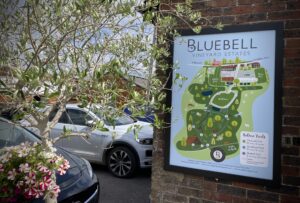
The Bluebell Vineyard encourages visitors to do more than just try its wine.
The Bluebell story is replicated at vineyards across Sussex and a number of wine producers from the county have already won ‘Best Sparkling Wine’ in many international competitions. The wine produced here is so special the Department for Environment, Food and Rural Affairs (DEFRA) has now recognised Sussex wine as a Protected Designation of Origin (PDO). This means Sussex wine has the same legal status as Jersey Royal potatoes, Cornish clotted cream and Stilton cheese.
Sussex Wine growth plan
But if wine is already important to Sussex, it is set to become even more so. It’s the “visitor experience” that Kevin described, that is at the heart of the new Sussex Wine Tourism Growth Plan, which was launched at Westminster on Wednesday last week (14 June).

ESCC Chief Executive, Becky Shaw, was among the guests at the launch. Pic by David Hartley.
It has ambitions to hugely increase its contribution to the county’s economy by raising the profile of Sussex as a premier national and international visitor destination. Outstanding wines, vineyard tours, tastings, food and drink and accommodation will all play a part.
The growth plan’s development has been overseen by two organisations: Sussex Modern; and the Sussex Visitor Economy Initiative. The latter is a partnership which includes East Sussex County Council and a wide range of public and private sector partners working together to grow the visitor economy of the whole of Sussex.
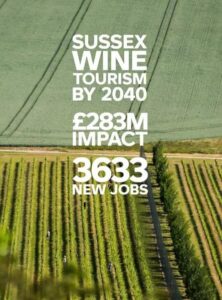
Houses of Parliament
Kevin was one of eleven Sussex vineyards showcasing the very best Sussex can offer at the event which was attended by MPs as well as representatives from all the organisations involved in the growth plan. “Wine-making is definitely growing significantly with more and more vineyards being planted. And its not just the growing conditions: people are much more aware of what they’re buying, aware of its carbon footprint, and the need to support local producers.”

Kevin Sutherland at the Parliamentary launch. Pic by David Hartley
There’s more information about how organisations plan to work together to develop the tourism potential of the county’s wine industry in the Sussex Wine Tourism Plan
For more information on the way organisations are working together to promote the whole of Sussex, visit the Sussex Visitor Economy Initiative website and the Sussex Modern website
You can also find out more about business support in East Sussex
If you or someone you know needs support with alcohol misuse there are a range of support services available in East Sussex: Drug and alcohol services | East Sussex County Council
